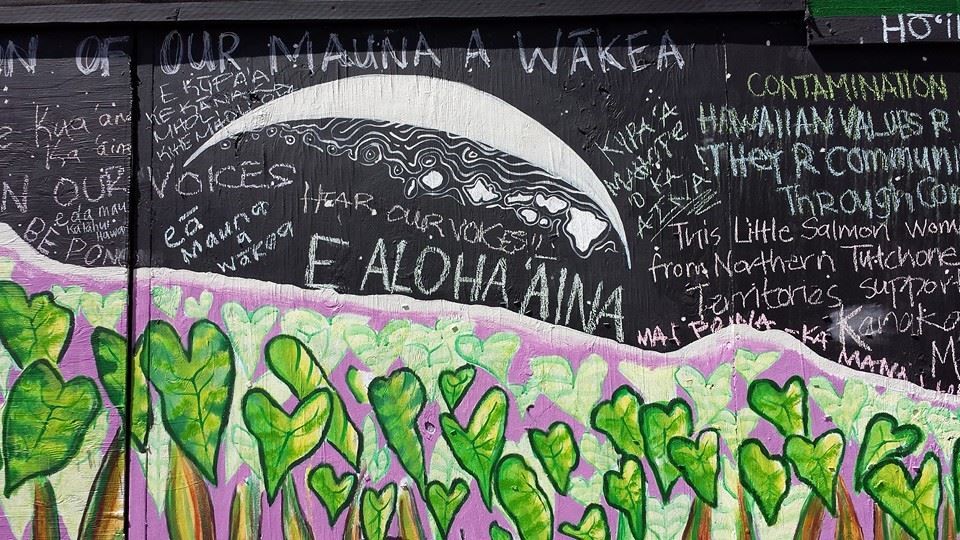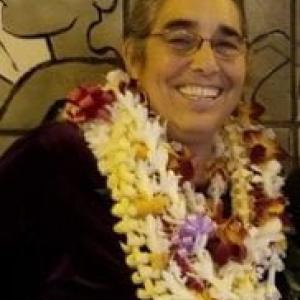Aloha ʻĀina – Rebuilding Our Fractured Relationship to Place
See Zoom details.
Mary Tuti Baker explores the practice of aloha ʻāina as an organizing principle at Hoʻoulu ʻĀina, a garden and forest complex run by a community health center in urban Honolulu, and in more politically charged mobilizations to protect sacred, storied places from desecration. When asked to define aloha ʻāina poet, painter and activist Imaikalani Kalahele replied, “If you leave ʻāina alone, it’ll take care of itself. What we need to learn is how to become a part of the ʻāina – again. That’s what aloha ʻāina is.” Often translated as love of the land, this does not capture the deep complexity and contradictions of aloha ʻāina. The first component of the phrase, aloha, is a powerfully paradoxical concept that is both exploited by settler society and emblematic of Kanaka Maoli as a people. Aloha in Kanaka Maoli understanding is the practice of reciprocating love and care for community and individual. Although ʻāina translates to English as land, Kanaka Maoli do not think of ʻāina as real estate. ʻĀina is that which feeds and as such it is an active agent of change. Aloha ʻāina in Kanaka Maoli understanding then is a practice of reciprocating kinship relationships between all existents including land, plants, animals (human and non-human), clouds, rain, and the multitude of geological and meteorological elements of place. Practicing aloha ʻāina rebuilds our fractured kinship relationship to place whether it is in the healing gardens of Hoʻoulu ʻĀina or the politically charged space of an encampment blocking heavy machinery from ascending a sacred mountain.

About the Speaker

Mary Tuti Baker is an Assistant Professor in Comparative Indigenous Studies with a joint appointment in Canadian-American Studies, Salish Seas Studies and Fairhaven College. A Kanaka Maoli (Native Hawaiian) scholar, she earned her PhD in Political Science from the University of Hawaiʻi at Mānoa with specializations in Indigenous Politics and Futures Studies. Her work examines the relationship between Kanaka Maoli values and practice and the politics of decolonization. She is currently working on a manuscript entitled “The Land Is in Us: Embodied Aloha ‘Āina Enacting Indigenous Futures” which is a critical examination of aloha ʻāina as an Indigenous ideology. She is interested in the political articulations across various Indigenous communities as well as non-indigenous social justice movements. Her most recent publication is a chapter in The Routledge Handbook on Postcolonial Politics entitled “Waiwai (Abundance) and Indigenous Futures” in which she tells the story of two communities in Hawai’i that are a part of a global network of native spaces whose diverse practices coalesce around the organizing principles of anarcha-indigenism, a world-view grounded in indigenous land-based practice and knowledge systems and anarchist principles of fluid leadership and horizontal power structures.
This talk is co-sponsored by the WWU Center for Canadian-American Studies and the WWU Salish Sea Institute.
Environmental Speaker Series
The Environmental Speaker Series is hosted by the College of the Environment at Western Washington University.
The Series is free and open to the public. Talks are held each Thursday at 4:30 pm in Academic Instructional Center West room 204 - AW-204. Talks will also be streamed via zoom. Register with the Alumni Association for the zoom link. Paid parking is available in lot C.
Learn more about the Environmental Speaker Series
Subscribe to the Email List